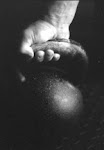If you say to yourself "I want to lose weight" or "i want to get strong arms" or "i want to bulk up" - that's great to have a desire. If that expression is not followed by a plan - a real, stick to it plan - that desire will not materialize. It's that simple.

Part of the process of getting fit/healthy is understanding clearly where we are now and where we want to go so we can build a path to get there. Two parts of this process are pretty simple: one is to have a clear goal, the other is to have clear ways to measure progress.
Sounds obvious, right? Well very few people i've spoken with about health/fitness actually have either a clear achievable health goal or a set of measures to know if they're making real progress. This post talks about a few ways to approach these basic parts of a health path.
o GOALS
it's apparently been shown that for any health program - whether eating or fitness - to have a continual, positive outcome, it's important to set goals that are SMART -
specific
measurable
attainable
realistic
time specific
If you want to set a nutrition goal, saying "i wanna lose ten pounds" could be the right goal for your health, but figuring out by when and with what plan will help make it real (is one pound a month steady and sure better than one pound a week? slower but more likely to get off and stay off?)
You may need help figuring out appropriate goals: if you're just starting a resistance program, what's a meaningful goal for the end of the first 6 weeks? furthermore, what's a reasonable plan to begin with?
o MEASURES
once you've figured a goal to achieve that you've figured out is attainable and that the plan you have for achieving it is realistic for the specific time frame, it's great to take measures before you start. You can see whether or not you've reached your goal if at the deadline you hit that mark. But what if you don't quite hit that mark? If you go under or exceed it, having a record of where you started and how you progressed is very useful for tuning your approach.
In nutrition, being able to see clearly how much of the time you stuck to your diet (was it 90% or only 75% of the time?) is a big win for being able to figure out where the problem may be. I like the precision nutrition approach here: they say eat six meals a day, and make sure you eat protein and some fruit and veg at each "feeding" - they have a chart with six meal slots and you just fill in whether you did or didn't "just do it" - it's easy easy to see if you met your target.
There's another study that has shown for weight loss, that a group that got onto the scale regularly (more than once a week) kept weight managed better than those that didn't (i found that on http://cbass.com - my hero: the guy's a lawyer and yet stays totally on top of the fitness literature)
A measure of where you are now, and where you get to - even if you don't exactly meet your goal - also is a great boast for showing progress, and providing some benchmarks for tuning those goals as well
So, if you're starting a workout or diet program, or thinking about starting one, looking at the SMART goal approach, and measuring up before you start and during your progress has shown that you're more likely to achieve those goals.
here's a couple of ways to measure your your progress
measure your neck and waist (add in hips if female)
Step on the scale
enter these results into the navy circumference method calculation to check your BF%
As for your workouts,
if you're on a bike: record your time, distance, and if you have a cycle computer, your cadence - gym stationary bikes usually have cadence. Check out how your heart rate improves over time doing the same intervals.
There's a whole lot more to measure if you'd like to get intrigued about monitoring progress, check out Precision Nutrition's Measurement Guide info online. You







